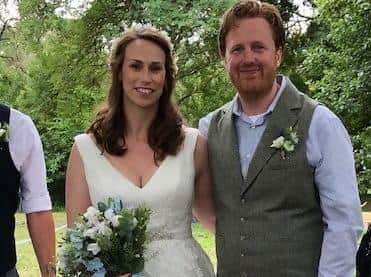Milton Keynes couple back High Court battle to get humanist weddings legally recognised
and live on Freeview channel 276
Six couples have launched a two day court battle, claiming the current law discriminates against them because of their humanist beliefs.
Backing them are MK couple Jitse and Kate Ameijde, who were married in June last year. They worked with the city's Humanist UK wedding celebrant Lori Brown to create a ceremony which reflected their own unique path, style, values, and personalities.
Advertisement
Hide AdAdvertisement
Hide AdHumanist weddings are becoming increasingly popular in MK, but under current law they are not recognised as legal marriages.


A humanist wedding is a non-religious ceremony conducted by a humanist celebrant who shares the beliefs and values of the couple. It differs from a civil wedding in that it is entirely personalised and reflective of the humanist beliefs and values of the couple.
They all must have a separate civil marriage – usually at a registrar’s office – for their marriage to be legally recognised, even though it is not always what they want, said Lori.
"Couples must go through formalities twice, leading to financial strain and distress over the state failing to recognise their humanist wedding as their ‘real’ one," she said.
Advertisement
Hide AdAdvertisement
Hide AdThe couples' lawyers will argue that the current law discriminates against them because of their humanist beliefs and is therefore incompatible with human rights legislation, which precludes such discrimination.


In England and Wales, more 1,000 couples a year choose have a humanist wedding, despite the lack of legal recognition.
Jitse and Kate said: "We decided to have a humanist ceremony because we wanted our wedding to reflect our values as a couple. The humanist approach provided us with an opportunity to actively shape the ceremony and acknowledge this special life event in a way that felt like a warm and informal celebration for our friends and family.
"Milton Keynes was an obvious choice for us as it has been a wonderful home to us both for many years, and we love the many wonderful things Milton Keynes has to offer and the beautiful spaces it provides".
Advertisement
Hide AdAdvertisement
Hide AdLori said: "“You can craft your own marriage vows and incorporate anything that speaks to your heart – music, readings or poems. You may also choose to include others in your ceremony – children, friends, parents, guide parents (the humanist equivalent of ‘god parents’).
“Wedding ceremonies are all about commitment. They’re not about class, race or gender and it’s my privilege to marry couples from all walks of life. The beauty of a humanist, non-religious wedding ceremony is that you can
hold yours wherever you like – at your home, in the garden, on a beach, a museum, a football stadium, a park, a restaurant, a hotel, abroad ... anywhere that is meaningful to you."
The couples' High Court case is being supported by Lori and Humanists UK. The claimants are being represented by Ciaran Moynagh of Phoenix Law, Caoilfhionn Gallagher QC of Doughty Street Chambers and Steve McQuitty BL of the Bar Library of Northern Ireland.
Advertisement
Hide AdAdvertisement
Hide AdHumanists UK Chief Executive Andrew Copson said: ‘Couples who have humanist weddings see that day as the epitome of their love and commitment to each other, and all they want is the same legal recognition for that as is given to every religious person in our country.
"We have tried for decades to address this glaring double standard. Government has dragged its heels and that’s why it’s been left to these couples to bring this case. As more and more non-religious couples choose to have humanist weddings, we need a law that works for all people who want to marry and we hope this case will lead to reform."
Parliament voted in 2013 to give the Government the power to give legal recognition to humanist marriages in but no government has used this power.
In the time since then, more than 6,000 couples have been denied legal recognition for their humanist wedding, either having to go to a state registrar for an unwanted second ceremony or not be legally married.
Advertisement
Hide AdAdvertisement
Hide AdThe six couples challenging the discrimination lodged their case at the High Court in November last year. Permission for the case to be heard was granted by the court on March 2,
The claimants offered to negotiate with the Government over possibly settling the case, particularly in light of the coronavirus pandemic, but this offer was refused.
Lori said: "It is now hoped that the case will lead to a change in the law in time to help deal with the huge backlog of demand for marriage services that is now occurring due to the pandemic."